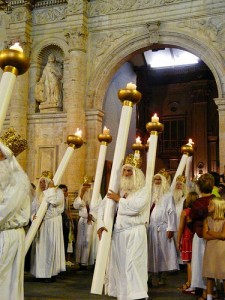It’s 2013, and that means new things are on the horizon! At Mt. Haley, that is very true in an interesting way. This year, one of our focuses will be on learning more about the nuts and bolts of how and why we worship God. Once a month, after our Sunday morning service, we will have an event entitled “How to be a Levite.” Each of these events will give you the opportunity to learn about the various roles and responsibilities of different people in our worship services.
In Old Testament days, Levites were people of the tribe of Levi – the tribe of Israelites who were in charge of the tabernacle of God. Moses and his brother Aaron were from the tribe of Levi, and Aaron’s descendants became priests and Levites, people who were designated for leadership in the worship of God at the tabernacle and, later, the temple in Jerusalem. Levites play a major role in the Old Testament, beginning in the book of Numbers. Take a look at 1 Chronicles 15 and see how important the Levites were when King David brought the Ark of the Covenant to Jerusalem for the first time.

Have you ever wondered what it’s like to be an usher or a chairperson in our worship services? Have you thought about reading scripture during the service, or perhaps have you wanted to improve your skills? How about participating on a newly-forming drama team or singing with the praise team? Why do we do all these things (and many more)? And how do we do them well, so that God is praised by all who gather for worship?
Those are the kinds of questions that this series will address. You are welcome to attend any or all of these sessions, regardless of whether you are interested simply in learning or in future participation. Just stay after church on the announced Sunday, share in lunch with those who stay, and then enjoy learning about our worship services!
This month, on January 20, we will focus on our audio/visual systems. How does our sound system work? How does the projection system work? Why are these systems vital to our worship experience? How can we use these systems to help people worship well? Stay after church on the 20th and we’ll discuss all these questions and more!
–Pastor David